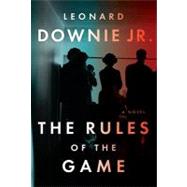
Leonard Downie Jr. has been executive editor of The Washington Post since 1991, during which time its news staff has won twenty-five Pulitzer Prizes. His books include Justice Denied, The New Muckrakers, and The News About the News (with Robert G. Kaiser). He lives in Washington, D.C.
The New copy of this book will include any supplemental materials advertised. Please check the title of the book to determine if it should include any access cards, study guides, lab manuals, CDs, etc.
The Used, Rental and eBook copies of this book are not guaranteed to include any supplemental materials. Typically, only the book itself is included. This is true even if the title states it includes any access cards, study guides, lab manuals, CDs, etc.
Excerpted from The Rules of the Game: A Novel by Leonard Downie
All rights reserved by the original copyright owners. Excerpts are provided for display purposes only and may not be reproduced, reprinted or distributed without the written permission of the publisher.